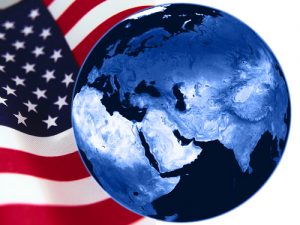By: Marco Roca
 It is hardly a groundbreaking revelation that this is a rapidly globalizing world. In fact, many theoretical physicists have taken to systematically forecasting the details surrounding our planet’s steps towards a united society. Michio Kaku, one of contemporary science’s most renowned minds, is one such example of a prolific theoretical physicist who directs a great deal of energy towards the science of futurology. Kaku predicts that by the end of the century, we will achieve a “Type 1” civilization status, a distinction that the theoretical physics community doles out to civilizations capable of harnessing the entire power of a planet. However, international cooperation is widely considered a prerequisite to achieving Type 1 status and having the capability to master our environment. Winding back even further, a universal language is thought to be needed to attain the adeptness necessary to become a planetary society. Theoretical physicists and I agree that English will be our ticket to international cooperation and eventual graduation to Type 1 Civilization status.
It is hardly a groundbreaking revelation that this is a rapidly globalizing world. In fact, many theoretical physicists have taken to systematically forecasting the details surrounding our planet’s steps towards a united society. Michio Kaku, one of contemporary science’s most renowned minds, is one such example of a prolific theoretical physicist who directs a great deal of energy towards the science of futurology. Kaku predicts that by the end of the century, we will achieve a “Type 1” civilization status, a distinction that the theoretical physics community doles out to civilizations capable of harnessing the entire power of a planet. However, international cooperation is widely considered a prerequisite to achieving Type 1 status and having the capability to master our environment. Winding back even further, a universal language is thought to be needed to attain the adeptness necessary to become a planetary society. Theoretical physicists and I agree that English will be our ticket to international cooperation and eventual graduation to Type 1 Civilization status.
Today, English is the world’s most spoken language with an estimated 1.5 billion speakers worldwide. Excluding China, English also has an “official” or “special” status in at least seventy-five countries, whose cumulative approximate 2 billion people the English-speaking world can smoothly interact with. Two of the world’s most important emerging economies, China and India, are in the middle of an English-learning craze. In China, at least 300 million citizens already speak English, and within the next five years all students will be required to start English classes in Kindergarten. This narrative is analogous in India, as Hindi is a feigned language spoken by very few in the country, and English is the official language of business, media, and higher education (most Indians can only speak one of several hundred unfeasibly localized languages and dialects). As the world’s interactions and economies become increasingly digitized, English is dominating the realm of technology, with 80% of all the information stored on the world’s computers. English’s commercial presence cannot be understated, and the Harvard Business Review recently stated that English is essential to conducting business globally. English also serves as one of three procedural languages of the European Union, one of six official languages of the United Nations, one of three official languages of the World Trade Organization, and an official language of countless other international organizations. Since English so deftly trounces all other world languages in its number of speakers, economic presence, and political power, it is clearly here to stay for some time.
As important as statistics are, I find that personal experiences are often most revealing. Although the following examples I share are unique to me, they all took place in the span of a few weeks, and I am certain they are typical abroad. My first example takes place in Lisbon, Portugal, where I saw a Chinese man and a Colombian woman bump into each other, and then break out into a verbal altercation. As ironic as it was to see a pointless fight break out on a national monument of Portuguese pride and rigidness, what most interested me was that the two individuals immediately resorted to what little English the other knew. In order for that to have happened, the two perfect strangers had to know that the other was at least proficient in English. While in Berlin, Germany, I helped edit a Czech man’s email written in English to an important German businessman. Although the Czech Republic and Germany share a border, neither could speak the other’s language, but both were well versed in English. In Hungary, the local who owned my hostel and her Japanese boyfriend could only communicate with each other using the English they knew. This of course indicates that English might actually be beating the romance languages at their own game. However, perhaps the most telling situation occurred while I was in Morocco and saw a French family communicate with a nomadic Berber in English. What struck me the most out of this otherwise mundane exchange was that Morocco was a French colony until 1956, and though French remains the language of economics, education, and government, both parties reverted to English. I firmly believe that incidents like this will be increasingly commonplace across the globe.
As staggering as English’s prodigious staying power may be, its growth is every bit as impressive. One leading hypothesis about demand for learning a second or foreign language is that the less usable a native language is outside a country’s borders, the more likely a country is to have significant demand for other more viable languages. One telling example is Sweden, the country thought to have the world’s highest English proficiency for a population that doesn’t have English as an official second language. Not to disparage the lovely Swedish language, but this phenomenon fits the hypothesis, as Swedish is a language seldom spoken outside the constraints of the country’s border and the nine million Swedes who use it daily. Since English is spoken more frequently and in more nations across the world than any other language in human history, a remarkable amount of demand for foreign language education is directed towards English. Also of tremendous importance is the fact that English is considered the “vacuum-cleaner” of all languages, readily sucking up words and expressions from all languages and cultures it makes contact with. Conversely, most world languages such as Arabic and French have special councils electing exactly what can and cannot become a word. English on the other hand is the world’s most diverse and adaptable language, with over 4,000 words added yearly. Many think that this diversity gives English-speakers a unique insight into key economic and political concepts, including the very essence of democracy, in addition to the ability to understand changing global trends. Just about anybody armed with these statistics and the ability to learn English would be crazy and at a severe disadvantage not to take advantage of the opportunity.
The upside for English assuming the position as the globe’s universal language is colossal. Perhaps the most obvious and important advantage would be an increase in global communication and understanding. While the latter assertion may come off as saccharine hogwash, there is reason to believe that an increase in linguistic understanding can relate to a proliferation of mutual tolerance, if only theoretically. Should English one day become the world’s standard language and the internet continue to unfurl throughout the world, it is not outlandish to think an individual could communicate with any other person on the face of the earth, regardless of background or geographic bearings. One can only imagine the reverberations this boon in the increased efficiency of correspondence would have on world peace, economics, education, and many other matters that affect our lives diurnally.
Regrettably, a single world language could also pose a wide array of issues. First, the transition could initially leave many behind and could prove potentially painful for many accustomed to a language dissimilar to English. Also during the transition years, it seems as if solely the elites in foreign countries will have access to English education, further oppressing and limiting opportunities for the lower classes. Also of grave concern is the fact that the omnipresence of one language risks killing off many native tongues and the cultural idiosyncrasies intrinsically linked to said languages. Finally, one world language could conceivably take away some of the world’s spark. That is to say that there may be unforeseeable damage to the latent desire within all of us to learn about other people and cultures if we are already connected by language. Therefore, we must ensure that we proceed with caution if one language is to be the way of the world.
No matter where the upshot of this trend takes us, it will be several decades before English is truly spoken all over the world (yes, even with its precipitous growth in popularity and demand). I also by no means encourage people to remain ignorant of foreign languages and cultures. I for one speak Spanish and am trying to learn French, as I believe people are at a loss if they do not experience all of the world’s other customs and traditions. Usually, knowledge of foreign languages is compulsory for full cultural exposure. In fact, while I agree with the theoretical physicists introduced at the outset of this article that English will be a language everybody speaks someday, I happen to think that the world will find an oligopoly of languages to be the most sensible option. It seems that if everybody defaults to English as a standard language and keeps their own native tongues, we can maximize the benefits of a Type 1 language, while minimizing its cons. According to Moore’s Law, available technology doubles every 18 months, and we might well sooner find ourselves in a future where translating technology follows us everywhere and instantaneously translates other people’s conversations into our languages of choice. Thus, the main takeaway here is that we are in a genuinely providential position to live in the English-speaking world during its most electrifying time.

